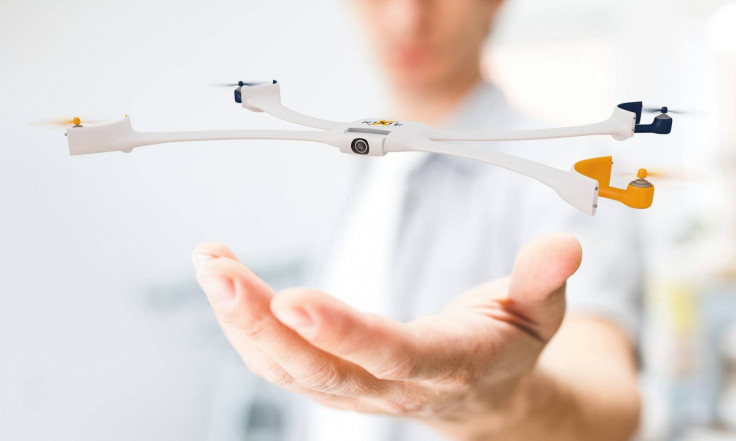Nixie: Tiny Flying Drone Camera Launches From Wrist to Take Selfies

Physics researchers at Stanford University are developing a wearable tech wristband that turns into a tiny flying drone that launches from a user's wrist to take selfies of the wearer.
Nixie is a finalist in Intel's Make It Wearable Challenge, a competition to encourage inventors and entrepreneurs to push the boundaries of wearable technology.
The researchers must now create a working prototype of their invention with help from industry mentors, in order to win a grand prize of $500,000 (£308,000).
The Nixie was originally designed as a pair of glasses, but the team realised it would be more useful as a wristband. The idea is that the wearer can press a button which turns the wristband into a tiny quadcopter drone that launches immediately from the person's wrist.
The drone flies into the air, orients itself and focuses to take a photograph of the user or anything else they want, with a range of settings that include 360-degree panorama shots and continuous movies, so that users can start shooting instantly and keep going.
"You should be able, with a gesture, to tell the quadcopter to unfold. It will take off from your wrist and it knows where you are, so it will turn around, take a picture of you, [then] it comes back, you can catch it from the air and put it back on your wrist," says Nixie team leader Christoph Kohstall in a video about the project.
The idea is for the flying drone wristband to be powered by Intel Edison, a tiny computer that is currently the size of an SD card, which is being offered by the chip manufacturer as a development system for wearable devices.
The most recent version of the Edison board includes a 22nm Silvermont dual core Intel Atom "Tangier" CPU, with 1GB of RAM integrated, as well as controllers for Wi-Fi, Bluetooth4, and USB.
The winner of the Make It Wearable Challenge will be announced on 3 November. The other nine finalist projects are using wearable tech for cooking, to induce lucid dreams, allow gamers to feel touch over the internet, and smart glasses that can read your mind.
© Copyright IBTimes 2025. All rights reserved.






















